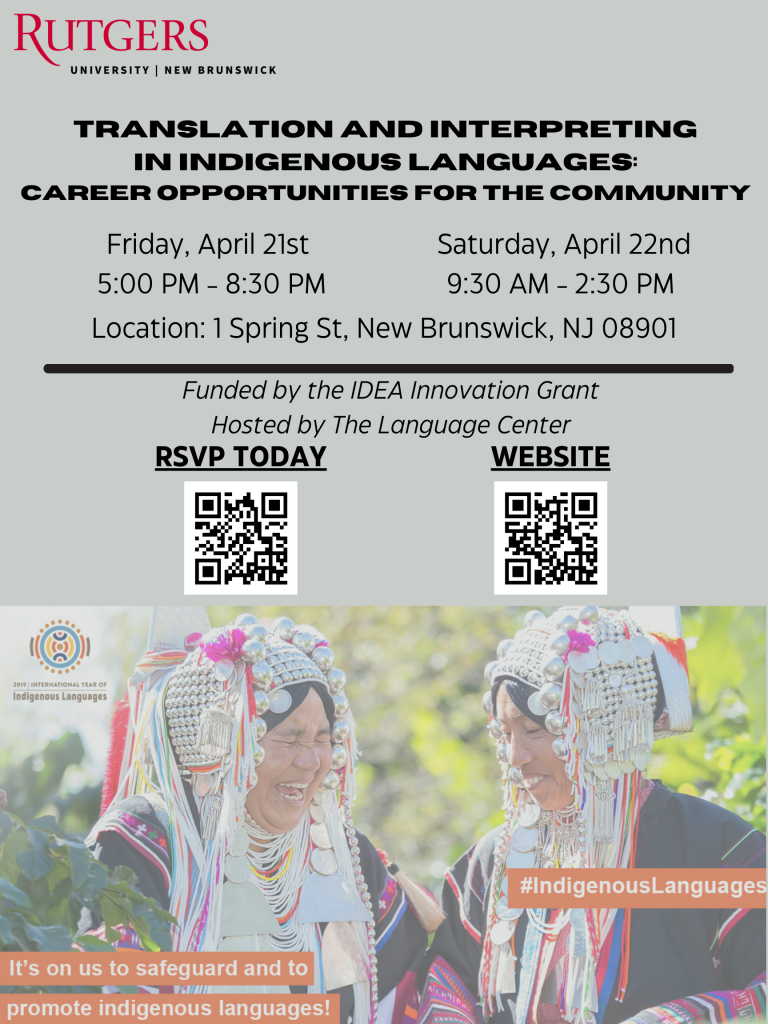 This past Friday and Saturday April 21 and 22 were two incredible days filled with education, inspiration, and community at our first-ever workshop, “Translation and Interpretation in Indigenous Languages: Career Opportunities for the Community.” Hosted at The Language Center in downtown New Brunswick, we had the pleasure of hearing from some amazing speakers who shared their expertise and experiences with us.
This past Friday and Saturday April 21 and 22 were two incredible days filled with education, inspiration, and community at our first-ever workshop, “Translation and Interpretation in Indigenous Languages: Career Opportunities for the Community.” Hosted at The Language Center in downtown New Brunswick, we had the pleasure of hearing from some amazing speakers who shared their expertise and experiences with us.
The event kicked off on Friday with a fascinating talk by Professor Häberl from Rutgers University, who provided an insightful overview of the linguistic landscape of New Jersey. Drawing from his own personal experience, he highlighted the importance of preserving and revitalizing minority, endangered, and indigenous languages in our communities. We were also fortunate to have Daniel Kaufman, professor at Queens College CINY and cofounder of the Endangered Language Alliance (ELA), who shared about the vital work that ELA does to promote and revitalize indigenous languages. He talked specifically about a project on health outreach among Indigenous Latin Americans in New York City that resulted in a series of videos on indigenous health that can be found here.
The videos of the talks are available here:
- Indigenous and Minority Language Landscape in New Jersey
- Health Outreach Among Indigenous Latin Americans in New York City: A Linguistic Perspective (unfortunately the audio of this presentation has some echo, but it is relatively easy to follow)
Saturday started off with Eleanor Bullock from GAMAE International, an organization dedicated to eliminating infrastructure deficits that hinder the growth of communities while preserving and revitalizing the traditional Garifuna history, cultural heritage, and language. Her presentation was both informative and inspiring as she shared about the history of the Garinagu people and the efforts her organization is making to keep their language and traditions alive. We also had a career opportunities panel where Karola Ranger from NJ Courts, and Shaheen Parveen and Laura Ramírez Polo from Rutgers University gave an overview of language assessment tests, the process of becoming a NJ certified court interpreter, and the certifications available for healthcare interpreters.All three presentations focused on the requirements and potential barriers to access these qualifications.
The videos of both talks can be found here:
- Remembrance of the Exiled Black Caribs of the Caribbean aka the Garifuna people
- Roundtable: Translation and Interpreting Career Access
Throughout the event, we had the pleasure of joining forces with scholars working on endangered, minority, and indigenous languages, as well as members of the community, such as Teresa Vivar from Lazos America Unida in New Brunswick and Puma Tzoc, from the Collective of Indigenous Interpreters of Oregon (CIIO).
The discussions at the conclusion of the talks were thought-provoking, and we explored different proposals to make indigenous, minority, and endangered languages more visible, promote and destigmatize language learning, especially among younger generations, and launch a new talk series for 2023-24 on the topic of revitalization and promotion of these languages sponsored by The Language Center.
We are incredibly grateful for the IDEA Innovation Grant that made this event possible. The event was an initiative of The Language Bank, which is a free service provided by The Language Center and the Rutgers University School of Arts and Sciences. Its mission is to provide high-quality translation and interpreting services to local non-profits, social services organizations, and outreach initiatives. One of the goals is also to become a hub for resources and training in translation and interpreting for the community.